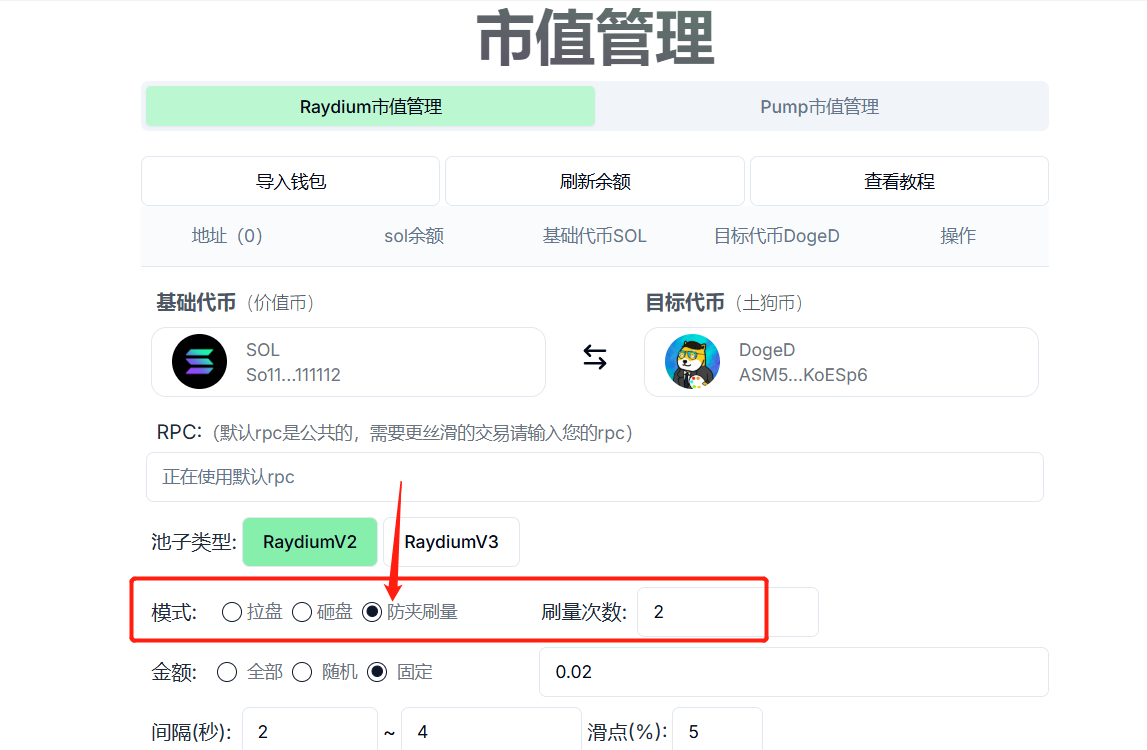In the prosperous development of the Solana chain, sandwich attacks (MEV bots) have become a headache for project teams. Sandwich attacks can hijack transaction profits, causing users to lose funds and even affecting the market data performance of projects. For example, if you want to inflate trading volume using multiple addresses, the sandwich bot will come in and take away the profits from your trades.
To address this issue, PandaTool has launched a brand new anti-sandwich trading volume tool, allowing project teams to effectively protect their funds in a market rife with sandwich attacks while optimizing trading data performance.
1. What is a Sandwich MEV Bot?
On the Solana blockchain, sandwich MEV bots profit through "sandwich attacks." These attacks occur in the middle of a user's transaction — the bot places an order before the user's transaction (driving up the price) and then sells after the user's transaction (driving down the price), earning the price difference.
2. Why is MEV Particularly Active on Solana?
Solana is known for its high throughput (TPS) and low transaction fees, providing MEV bots with faster trading opportunities and lower execution costs. These features make it an ideal platform for high-frequency trading and arbitrage.
3. Strategies and Operations of MEV Sandwich Bots
Sandwich bots profit through the following strategies:
Front-running: Monitoring user transactions in the pending transaction pool and placing orders before the user.
Back-running: Immediately completing a reverse operation after the user's transaction to lock in profits.
Arbitrage: Utilizing on-chain and cross-chain price differences to achieve risk-free trading.
For example, when a user exchanges tokens on Solana's AMM (automated market maker), the bot can sandwich the user in the trading pool, manipulating price slippage.

4. Potential Problems and Impacts of MEV
Losses for Ordinary Users: Sandwich attacks can impose higher transaction costs on users (such as slippage and worse exchange rates).
Challenges to Network Fairness: Excessive MEV activity may harm user experience and undermine the fairness and decentralization principles of the blockchain.
Impact on Market Stability: A large number of high-frequency sandwich trades may exacerbate market price volatility.
5. How to Prevent Sandwich Bots?
Blacklisting: Freezing the addresses of sandwich bots to prevent them from trading. However, retaining blacklist privileges may cause concerns among other users, making it a less favorable suggestion.
Cooling Off Trading Time: Implementing a trading cooldown to prevent sandwich bots from buying and selling in a short time. This method can be implemented on BSC and EVM chains, but is not supported on Solana.
Open and Buy: Immediately buying when the pool opens, ensuring your purchase price is lower than that of the sandwich bot, can help mitigate the bot's impact. However, in regular trading, arbitrage bots cannot be completely blocked.
6. Why is Trading Volume Important?
Trading volume is a crucial indicator for token projects to attract users and gain market attention. High trading volume not only increases market activity but also enhances the token's exposure and credibility, thereby attracting more investors. However, the presence of sandwich bots leads to significant losses for project teams when inflating volume, even negatively impacting market data.
7. How to Understand PandaTool's Anti-Sandwich Trading Volume Tool?
PandaTool's anti-sandwich trading volume tool is specifically designed to combat sandwich attacks, allowing you to increase token trading volume while eliminating the risk of being arbitraged by sandwich bots. It features the following unique innovations:

Completing Buy and Sell Operations in the Same Block: By executing buy and sell matching within the same block, the tool effectively avoids sandwich attacks, ensuring transactions are completed before the bot intervenes, thus preventing fund theft.
Optimized Transaction Security: Every transaction by users is protected by an anti-sandwich mechanism, avoiding unnecessary losses caused by sandwich bots, especially in a highly competitive market environment.
Enhancing Trading Performance and User Confidence: Project teams can leverage the tool to significantly increase trading volume and frequency in a short time. This not only helps establish a good reputation within the community but also attracts more investors and potential users' attention.
8. Use Cases and Value of the Anti-Sandwich Trading Volume Tool
Initial Cold Start of Tokens: In the early stages of a token, the market pays high attention to liquidity and trading activity. The anti-sandwich trading volume tool can help projects quickly accumulate impressive trading data, driving early recognition. Additionally, having trading volume can help the token achieve price visibility.
Project Promotion and Collaboration Showcase: High trading volume and liquidity data are important indicators for attracting partners. PandaTool's anti-sandwich tool can help project teams optimize these data in a short time, adding leverage to collaboration negotiations.
Responding to the Prevalence of Sandwich Bots: As sandwich behavior becomes increasingly rampant on the Solana chain, PandaTool's anti-sandwich trading volume tool is a powerful weapon for project teams to establish themselves in the competition.
As the Solana ecosystem continues to expand, sandwich bot attacks have become an issue that cannot be ignored. PandaTool's anti-sandwich trading volume tool provides an innovative and efficient solution, not only protecting the financial security of project teams but also enhancing market performance through data optimization.
免责声明:本文章仅代表作者个人观点,不代表本平台的立场和观点。本文章仅供信息分享,不构成对任何人的任何投资建议。用户与作者之间的任何争议,与本平台无关。如网页中刊载的文章或图片涉及侵权,请提供相关的权利证明和身份证明发送邮件到support@aicoin.com,本平台相关工作人员将会进行核查。




